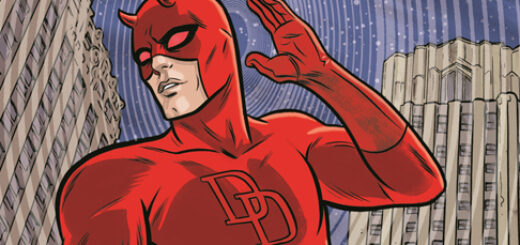The Law Is A Ass #445: The Justices Tell Daredevil SCOTUS Hell

I trust none of you doubted me.
I told you last column that the Supreme Court of the United States https://www.supremecourt.gov would accept jurisdiction over Matt (Daredevil) Murdock’s appeal in the case of New York v Slugansky. And in Daredevil Vol 5 #25, there he was before the Supreme Court arguing that the New York Court of Appeals was wrong when it reversed a lower court’s ruling that masked super heroes should be allowed to testify without revealing their real identities and that the Supreme Court should reverse the New York Court of Appeals and reinstate both Slugansky’s conviction and the lower court’s ruling permitting masked super heroes to testify anonymously.
Of course, I had a slight advantage. I read Daredevil #25 months ago. I wrote that last column with it’s will he or won’t he get to the Supreme Court line this month. So I sorta, kinda, already knew what the Supreme Court did before I wrote that cryptic closing.
Before Matt actually set foot in the Supreme Court building, he made a stunning confession to his friend and former law partner Franklin (Foggy) Nelson. Matt admitted he took a dive. He lost the appeal in the New York Court of Appeals on purpose just so he could argue the case before the US Supreme Court and create precedent that would cover not just New York but the entire country.
Which, as professional ethics go, is only slightly better than pushing your client under an oncoming steam roller after having picked his pocket. Better, but still messier.
Lawyers are supposed to represent their clients’ interests. First and foremost. They are supposed to care about what is best for their clients. Not what is best for the whole country. If the two interests coincide, so much the better. If they don’t, the client must come first.
So instead of winning the case for his client, the state of New York, Matt intentionally lost it in the hopes that he could get the case before SCOTUS and that they were on his side so he could make nationwide law. This tactic is, in a word…
You thought I was going to say unethical, didn’t you? Nope, I was going to say stupid, with a capital EEWWW.
See there was an inherent risk in Matt’s strategy. Namely, what if SCOTUS didn’t take the case? Then Matt would have had precedent from the highest court in New York which would be controlling law in New York and would be persuasive precedent other state and federal courts could cite; precedent that went against him. And he’d have the tacit agreement from the Supreme Court that the New York court was correct. If it were wrong, SCOTUS would have accepted the appeal.
Or, to put it in sports terms, Matt would have Dick Bupkiss.
But what if Matt won in the New York Court of Appeals? Why then, he’d have controlling precedent for all of New York and which other state and federal courts could site as persuasive authority; precedent that agreed with his position. And he’d probably still get the case before the Supreme Court so that he could make that nationwide law.
Matt suspected that Wilson (The Kingpin of Crime) Fisk hired ace attorney Legal to handle Slugansky’s appeal and take away his lower court win. Do he think after appealing the case up through the New York courts, Fisk and Legal would stop there? No, if Matt had won the case in the New York Court of Appeals, then they would have petitioned SCOTUS for a writ of certiorari, and the case would have ended up there anyway.
Same result. But this way would have been way safer, because Matt would have had the winning precedent on his side throughout the entire proceedings. Best of all, Matt, you would have been ethical throughout, because the interests of his client and the country would have coincided.
Quick aside. Yes, Kingpin’s lawyer was named Legal. That’s also what he was named, when he was corporate counsel for Tony Stark. Did Legal change his name from something else. Is Legal even his legal name? And no matter what his real name is, why did whoever designed Legal decide to make him look like Mr. Six? No, not the character from the 2015 Chinese crime drama, I mean that creepy-looking dancing mascot for Six Flags.
Oh well. Matt and Legal argued their case in the Supreme Court. Now if you think ordinary courtroom proceedings are visually uninteresting, what with them being basically a lawyer standing in front of a sitting witness while a question and answer session between them goes on, imagine what an appellate proceeding would look like. Me, I don’t have to imagine, I lived them for 26 years.
A lawyer stands behind a podium and gives a speech to a panel of judges. The judges ask questions. The lawyer answers them. Visually about as stimulating as the former Bountiful Valley Farm area of Disney’s California Adventure; where a family of four could spend hundreds of dollars so that their five-year-old could literally watch grass grow.
The story got around this lack of visuals by having a symbolic scene as Matt argued his case. Instead of the justices of the Supreme Court attacking his case by asking questions, they physically attacked Matt while they asked their questions. Yes, I know the scene was imaginary, even symbolic. Still, it was a bit jarring to see 85-year-old Justice Ruth Bader Ginsburg leap off the bench and deliver Captain Kirk’s patented flying drop kick in the middle of oral arguments.
After Legal had his turn, Matt got to deliver his rebuttal. Usually, that’s when counsel for the petitioner points out one last time the flaws in the opposing side’s case. Matt didn’t do that. Instead he made an emotional appeal that would have been the envy of every lawyer on LA Law.
“Ignoring powered individuals’ ability to help us because we fear what it might mean if we bring them into the system is a terrible waste. A criminal waste, in fact… Let the heroes help. Let us all help each other. Don’t be afraid.”
In all my years as a practicing appellate attorney, and as I said a bit earlier, there were over twenty-six of them, I never tried an argument like that. Know why? Because they don’t work. Appellate judges want case law and precedent they can hang their legal hats on – it has to be hats, judges don’t wear those stuffy wigs in American courts. They don’t want meaningless Dr. Feelgood platitudes, because they wouldn’t feel good about basing a legal decision on them.
Still, Matt must have known what he was doing with that rebuttal, he won the Supreme Court case 7-2. So Matt was happy. Foggy was happy. Manhattan DA Ben Hochberg was happy. Everyone was happy. Everyone except Wilson Fisk and Simon Slugansky.
Especially Simon Slugansky. Now Slugansky’s name will forever be associated with a case that’s bad for him and his criminal co-workers. Whereas before the only bad thing associated with his name was his rather unfortunate nickname; Slug.













